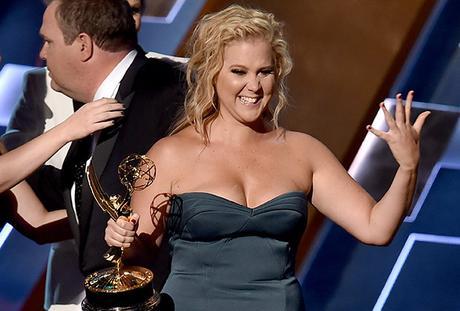
https://pmctvline2.files.wordpress.com/2015/09/amy-schumer-emmys-2015.jpg?w=620&h=420&crop=1
It’s no secret that Hollywood is sexist. Studies, industry insiders and even the ACLU all confirm this. But as the many female creatives who won in their categories at the 2015 Primetime Emmy Awards just proved, the problem is not due to a lack of talented or capable women in the industry — but the previous refusal of the industry to produce the stories they want and need to tell.
Many are aware that women are quantifiably underrepresented in the entertainment industry. A recent 2015 Women’s Media Center’s report found that studio senior management is 92% white and 83% male, and that for the 250 most profitable films made in 2014, 83% of the directors, producers, writers, cinematographers and editors were men. It’s a problem also evident in the history of the Emmy awards specifically: Only 22% of all nominees nominated in 44 writing, directing, editing, and producing categories over the past decades, according to a recently published Women’s Media Center 10-year Emmy study.
Fighting for more women to infiltrate the industry, therefore, is certainly crucial. After all, studies show that media representation impacts viewers in a meaningful way and, as the aforementioned statistics suggest, most media to date has reflected the white men at its helm. Golden Globe and now-Emmy Award winning director Jill Soloway aptly summarized this.
“Male creators, showrunners, producers and directors have to really face the immorality, their own immorality, of hiring their friends, of telling male stories, of perpetuating male privilege through protagonism,” Soloway said at a July Women in Film fundraiser, according to Variety. “So that means the male gaze — men as subject, women as object — is business as usual for men to be able to keep telling their stories from their point of view.”
But the fact that so many women in creative roles won this year is not only meaningful in terms of pure representation, but also significant because of the stories they told and the experiences their work represents. Jill Soloway, creator and director of Transparent, was honored for directing a show centered on a trans woman named Maura. The director and writer of Olive Kitteridge were acknowledged for telling the story of a complex female character, based on a book written by a female author. Amy Schumer was recognized for sketches that skewer women’s experiences with sexism, ranging from unattainable beauty and age-related standards to chronic apologizing to sexual assault in the military.
These wins are not just victories for the winners themselves, therefore, but for women who want their authentic lives represented on screen. It’s a victory for audiences of all genders, ages, and other identities who will benefit from witnessing stories that previously have not and could not have been told. And as women like Soloway, Schumer and others continue to prove that these stories are interesting and valuable for everyone — and as mainstream awards shows recognize that — we’ll all benefit.

